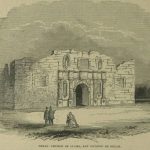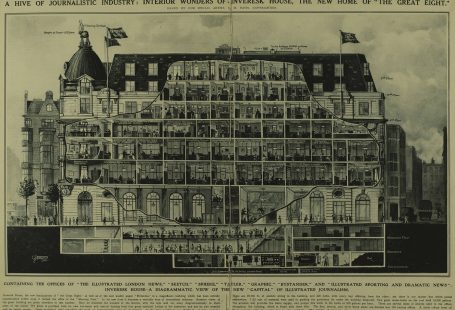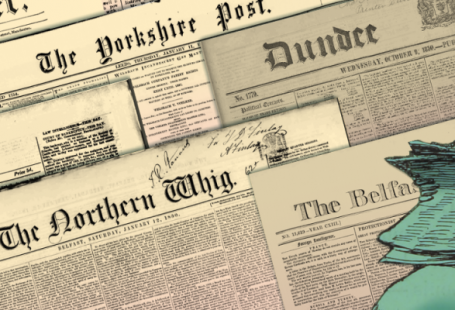Saving Seamen’s Lives (part 2). Samuel Plimsoll – Blog #8 by Edmund King
If you have ever stood during a gale, upon a cliff top anywhere round the coast of Britain, your thoughts inevitably turn to those out at sea. Many ships were driven ashore during storms, unable to combat the elements. The development of lighthouses round the coast of Britain in the 19th century greatly reduced the risks of ship running aground. But what of man-made indifference to the lives of seamen? It was well known in Britain’s ports, that loss of life was happening because ships were too heavily laden with cargo, which had the effect of making them founder at sea, all the more easily. It was this continual loss that attracted the attention of Samuel Plimsoll. He gave more than twenty years of his life in seeking a remedy for the unnecessary loss of seamen’s lives.
His earlier experiences had given him experience in how to proceed to secure reform; he was a self-made man, who had made money as a coal merchant. He knew how to thrust himself to the attention of many. When the Italian hero Garibaldi visited London in 1864, it was Plimsoll who was Chairman of the City [of London] Reception Committee. He accompanied Garibaldi to the Barclay & Perkins Brewery. At the end of his tour, Garibaldi, being handed a tankard of ‘Barclay’s Stout’, had proposed the health of the workers. Samuel Plimsoll then proposed the health of General Garibaldi, “… which was drunk with deafening cheers.” [i]
Lancaster Gazette – Saturday 23 April 1864 page 10
Image © THE BRITISH LIBRARY BOARD. ALL RIGHTS RESERVED.
http://www.britishnewspaperarchive.co.uk/viewer/bl/0000488/18640423/052/0010
Plimsoll knew that, if he wanted to work to assist the cause of political reform, he would need to become a Member of Parliament. Reform came to include the improvement of the the situation of merchant seamen. He was elected to Parliament in 1867, as the Member for Derby.
In the years after his election, Plimsoll examined the deficiencies of over laden ships, and proposes remedies. It was well known that ship owners profited from the insurance payable on the cargos of ships that sank – so there was little wish on their part to change the situation, even if seamen’s lives were being lost as a result of over loading.
An Editorial of the Sheffield Daily Telegraph of 19 April 1870 stated Plimsoll’s proposals for inserting three clauses into the Mercantile Marine Code:
- Inspection of all vessels
- Adoption of a maximum load line
- Limiting the proportions of property that can be insured for any one ship
Sheffield Daily Telegraph – Tuesday 19 April 1870 page 2. Col 2. Domestic [news]
Image © THE BRITISH LIBRARY BOARD. ALL RIGHTS RESERVED.
A week later, the long Editorial of the Sheffield Daily Telegraph of 23 April 1870 rehearses the arguments again. It is a sign of Plimsoll’s activity that he is quoted several times as a leader who proposes to remedy the situation. “Mr. Plimsoll has another remedy – a load line or mark on the hull [of the ship], below which it shall not be lawful to load her. “
Sheffield Daily Telegraph – Saturday 23 April 1870 page 2 col. 3.
Image © THE BRITISH LIBRARY BOARD. ALL RIGHTS RESERVED.
http://www.britishnewspaperarchive.co.uk/viewer/bl/0000250/18700423/001/0002
Plimsoll continued to receive publicity, receiving reports in the London papers in May 1870. The Pall Mall Gazette took up the cause in its issue of 31 May 1870, in an article entitled: “Perils at Sea”, concluding: …”we trust Mr. Plimsoll will press it home.”
Pall Mall Gazette – Tuesday 31 May 1870 page 1
Image © THE BRITISH LIBRARY BOARD. ALL RIGHTS RESERVED.
http://www.britishnewspaperarchive.co.uk/viewer/bl/0000098/18700531/001/0001
Implementing the reform was to take time. Plimsoll faced much opposition from ship owners. He published Our Seamen early in 1873. A review by the Sheffield Daily Telegraph of 22 January 1873 stated: “…we beg to offer Mr. Plimsoll our thanks for the high and chivalrous courage with which he has addressed himself to the task of exposing the infamous way in which lives are lost in order that money may be the more rapidly made by unscrupulous ship owners.”
Sheffield Daily Telegraph – Wednesday 22 January 1873
Image © THE BRITISH LIBRARY BOARD. ALL RIGHTS RESERVED.
http://www.britishnewspaperarchive.co.uk/viewer/bl/0000250/18730122/004/0003
Only a month after this, Eustace Smith (for the ship owners) raised a question of privilege in the House of Commons and accused Plimsoll of being disrespectful to the House. Plimsoll, who did not have advance notice of the accusation, made a proper apology to the House, and Mr. Gladstone intervened near the end of the exchange, stating that the House was minded to accept Plimsoll’s apology.
Sheffield Daily Telegraph – Friday 21 February 1873 page 3
Image © THE BRITISH LIBRARY BOARD. ALL RIGHTS RESERVED.
http://www.britishnewspaperarchive.co.uk/viewer/bl/0000250/18730221/029/0003
The campaign was continued; there was a long report – of three and a half columns – of a public meeting held in support of the seamen and of Plimsoll’s efforts, held in Sheffield, reported on the 27th February. The cause of saving lives was proving very popular. The report begins with an apology from Plimsoll for not attending the meeting.
The end of the meeting was a rousing call: “He saw sufficient on that occasion to convince him that the perils of the sea were such that it was their duty to use every means in their power to prevent such loss of life. … They who lived inland towns did not see much of the agony which caused by these calamities, when a wife or children heard that such and such a vessel was missing and had gone down, and that all who were dear to them had gone down also. … Things had now come to this – Mr. Plimsoll revelations had brought them into that state that the people of England were now so aroused that they would demand a commission of inquiry. They would not rest until some plan was adopted by which human life might be rendered safe, and therefore he again said all honour to Mr. Plimsoll, who had so nobly begun the movement (Cheers)”
Sheffield Daily Telegraph – Thursday 27 February 1873
Image © THE BRITISH LIBRARY BOARD. ALL RIGHTS RESERVED.
http://www.britishnewspaperarchive.co.uk/viewer/bl/0000250/18730227/021/0003
The report in The Star of 25 March 1873 placed emphasis upon the possible wrong doing of only a minority of ship owners, and hoped that the Royal Commission of Inquiry would do its work well.
The Star – Tuesday 25 March 1873
Image © THE BRITISH LIBRARY BOARD. ALL RIGHTS RESERVED.
http://www.britishnewspaperarchive.co.uk/viewer/bl/0000184/18730325/009/0002
The article in the Birmingham Daily Post of 14 July 1874 shows how much work Plimsoll did in advancing the cause of the seamen: He attended the Jubilee in Manchester of the Number One Society of Makers-up, to receive fifty guineas for the Seamen’s Defence Fund. He expressed his criticism of the work of the Royal Commission; it had not had enough sessions; its members had not visited ports to gather information. Its members tended to defend the status quo rather than consider how change may be made. A similar report was also printed in the Manchester Times of 18 July 1874.
Birmingham Daily Post – Tuesday 14 July 1874 page 7
Image © THE BRITISH LIBRARY BOARD. ALL RIGHTS RESERVED.
http://www.britishnewspaperarchive.co.uk/viewer/bl/0000033/18740714/026/0007
The Merchant Shipping Acts Amendment (No.2) Bill was printed by March 1875, according to the Staffordshire Sentinel – Thursday 11 March 1875. Its provisions were guided by the need to save seamen’s lives.
Staffordshire Sentinel – Thursday 11 March 1875 page 4
Image © THE BRITISH LIBRARY BOARD. ALL RIGHTS RESERVED.
http://www.britishnewspaperarchive.co.uk/viewer/bl/0000346/18750311/016/0004
In the normal course of events, this bill would receive its readings in the House of Commons and in the House of Lords, and (possibly with amendments) proceed to be passed into law. However, on the 22 July, the prime minister, Disraeli, announced that this bill would be delayed in favour of the Agricultural Holdings Bill. Plimsoll, in his frustration at this delay, challenged the whole House of Commons, not once, but twice. The Dover Express carried a verbatim report the next day of the proceedings. Plimsoll called the ship owners “ship knackers”, who sent unseaworthy ships to sea, overladen with cargos which imperilled the lives of seamen.
In the heat of the moment, he said: “ ‘I am determined to unmask the villains who send to death and destruction’ – (loud cries of ’Order’, in the midst of which Mr. Plimsoll left his seat, and walking up to the table, stood in the middle of the floor, and, facing the Speaker, shook his clenched hand first at the one and then at the other side of the House. There was naturally great uproar, and when it had subsided and the hon. Gentleman had sat down.) For his actions, Plimsoll was reprimanded.
Dover Express – Friday 23 July 1875 page 3
Image © THE BRITISH LIBRARY BOARD. ALL RIGHTS RESERVED.
http://www.britishnewspaperarchive.co.uk/viewer/bl/0000330/18750723/015/0003
The same day, The Pall Mall Gazette was much more measured in backing Plimsoll, and general in condemning the government for failing to place greater priority for the Merchant Shipping Bill:, saying: “It is the simple truth that men will perish this winter from preventable causes, and the they or some of them would not have perished if the Government had proceeded with the Merchant Shipping Bill.”
Pall Mall Gazette – Friday 23 July 1875 page 1
Image © THE BRITISH LIBRARY BOARD. ALL RIGHTS RESERVED.
http://www.britishnewspaperarchive.co.uk/viewer/bl/0000098/18750723/001/0001
Towards the end of its Editorial, the paper wrote: “ A Government which is slow to appreciate the difference between measures of convenience and measures of necessity – which shows so defective a sense of proportion in it view of human affairs as to prefer the readjustment of pecuniary rights to the protection of human life – declares itself out of accord with the sense of practical people over those whose destinies it is is called to preside. Not only does such a government discredit itself, but it discredits our whole parliamentary system also.”
Pall Mall Gazette – Friday 23 July 1875 page 1
Image © THE BRITISH LIBRARY BOARD. ALL RIGHTS RESERVED.
http://www.britishnewspaperarchive.co.uk/viewer/bl/0000098/18750723/001/0001
However much Plimsoll was criticised for his actin in the House of Commons in July 1875, the cause he worked for, remained very popular. The Disraeli government introduced a Merchant Shipping Act in the parliament of 1876. Early interest in this Bill was keen – three identical reports, reprinted from The Standard, appeared on the 4 December 1875 in the Lancaster Gazette, the Morpeth Herald and in the Leicester Chronicle. Plimsoll’s efforts were taken up in the arena of music hall at the Theatre Royal in Sheffield:
“Ladies and Lasses, do not rest until
You’ve pass’d the Plimsoll Merchant Shipping Bill
Abolish picketing; by law engage.
To give a fair day’s work a fair day’s wage.”
Sheffield Daily Telegraph – Thursday 27 January 1876 page 3
Image © THE BRITISH LIBRARY BOARD. ALL RIGHTS RESERVED.
http://www.britishnewspaperarchive.co.uk/viewer/bl/0000250/18760127/039/0003
In the same newspaper, on the 17 August 1876, Plimsoll spoke at a presentation of a silver medal to his wife , saying that, although the Bill was imperfect, he would support its passage, as it “…was their duty to get the utmost possible good out of it.”
Sheffield Daily Telegraph – Thursday 17 August 1876 page 3
Image © THE BRITISH LIBRARY BOARD. ALL RIGHTS RESERVED.
http://www.britishnewspaperarchive.co.uk/viewer/bl/0000250/18760817/035/0003
Finally, the Merchant Shipping Act was passed on the 1 October 1876. The Aldershot Military Gazette – Saturday 07 October 1876 stated an account of its provisions. Those who sent unseaworthy ships to sea would be found guilty of a misdemeanour. Plimsoll’s campaign was finally successful.
Aldershot Military Gazette – Saturday 07 October 1876 page 6
Image © THE BRITISH LIBRARY BOARD. ALL RIGHTS RESERVED.
http://www.britishnewspaperarchive.co.uk/viewer/bl/0000212/18761007/038/0006
Plimsoll’s public popularity was celebrated in A Cheer for Plimsoll, written and sung by Fred Albert in 1876.
So a cheer for Samuel Plimsoll and let your voices blend
In praise of one who surely has proved the sailors’ friend
Our tars upon the ocean he struggles to defend
Success to Samuel Plimsoll for he’s the sailors’ friend.
There was a time when greed and crime did cruelly prevail
and rotten ships were sent on trips to founder in the gale
When worthless cargoes well-insured would to the bottom go.
And sailors’ lives were sacrificed that men might wealthy grow.
For many a boat that scarce could float was sent to dare the wave
’til Plimsoll wrote his book of notes our seamen’s lives to save
His enemies then tried to prove that pictures false he drew
but with English pluck to his task he stuck, a task he deemed so true.
[Reproduced at: http://www.rmg.co.uk/explore/sea-and-ships/facts/ships-and-seafarers/load-lines © 2013 National Maritime Museum. All rights reserved.]
How many lives did Plimsoll save? The Royal Museums at Greenwich website offers one piece of information relevant to this question, discussing load lines, overloading, loss of life and the refusal of sailors to go to sea in dangerous ships. [ii] In response to the question – ‘Were many ships lost?’, it says: “Yes. For example, in the year 1873–74, around the coastline of the United Kingdom, 411 ships sank, with the loss of 506 lives. Overloading and poor repair made some ships so dangerous that they became known as ‘coffin ships”.
You, the reader, can do your own calculations as to how many seamen’s lives Plimsoll saved – it must have been many thousands.
Ed King
March 2013
Further reading:
Nicolette Jones. The Plimsoll sensation. The great campaign to save lives at sea. Little, Brown, 2006.
Merchant Shipping Bill 1876: http://hansard.millbanksystems.com/commons/1876/apr/06/merchant-shipping-bill-bill-49
Samuel Plimsoll;s Merchant Shipping Act 1876: http://www.victorianweb.org/history/plimsoll.html
Plimsoll Gear: http://www.plimsollgear.com/the-plimsoll-story/
[i] You can look at other accounts of Garibaldi’s Progress in London, accompanied by Plimsoll, at : http://www.britishnewspaperarchive.co.uk/search/results/1864-01-01/1864-12-31?basicsearch=plimsoll%20garibaldi&somesearch=plimsoll%20garibaldi
[ii] Royal Museums Greenwich: http://www.rmg.co.uk/explore/sea-and-ships/facts/ships-and-seafarers/load-lines






6 comments On Saving Seamen’s Lives (part 2). Samuel Plimsoll – Blog #8 by Edmund King
Woah! I’m really loving the template/theme of this blog. It’s simple, yet effective.
A lot of times it’s very difficult to get that “perfect balance” between superb usability and visual appearance. I must say you’ve done a
superb job with this. Additionally, the blog loads very quick
for me on Chrome.
Excellent Blog!
Hi Kari, we’re very pleased to hear that you like the BNA blog – we hope you return again to check out the new content. Regards, Grant.
Thanks for the original fragments, very interesting.
We’re very pleased to hear that you liked the article on Samuel Plimsoll. Regards, Grant.
Thank you for a very well composed Blog, and Thank you Mr Plimsoll, as a Mate on North East Colliers in the 50’s & 60’s, I loaded to your lines, with confidence many times.
Hi John, we’ve very pleased that you liked the article on Plimsoll – with your experience of the sea, it’s clear that Plimsoll was a major influence on your working life. Here is another blog post about Samuel Plimsoll:
http://blog.britishnewspaperarchive.co.uk/2013/02/10/sir-samuel-plimsoll-inventor-of-the-plimsoll-line/
Best regards,
Grant.